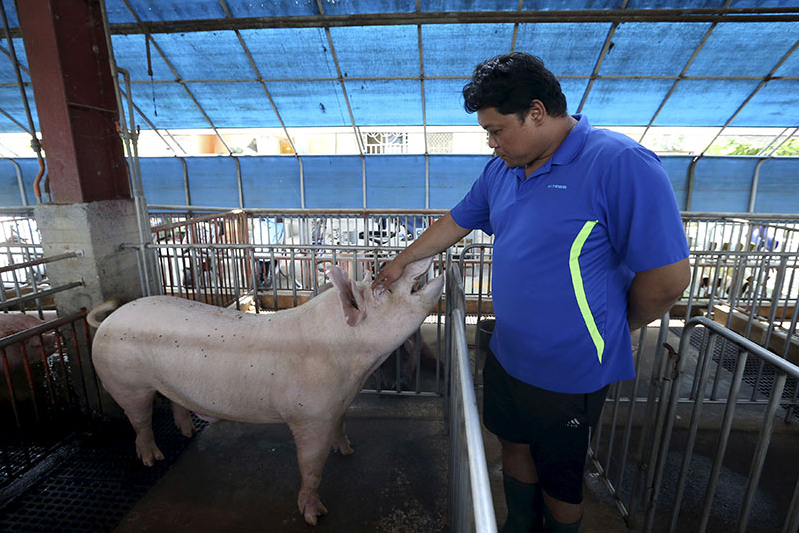
A Christian organization based in the United Kingdom called A Rocha has engaged in scientific research, environmental education and community-based conservation projects. It works on the idea that "the gospel is for the planet as well as people."
In an interview conducted by Joel Forster of Evangelical Focus, A Rocha member David Bookless encouraged Christians to start acting according to the value that Scripture gives to the Earth. He pointed out that Christians, especially those in the West, have "bought into the materialism of our secular cultures in a way that is deeply unbiblical."
"The reason why we care for the Earth is not primarily because we love nature, although we may do; it is not primarily because there is a crisis that is affecting us all, although there is," Bookless said of his role in the environmental NGO. "Our primary reason is because we believe that Jesus Christ is Lord of all creation."
Bookless cited Psalm 24 and Colossians 1 as reasons why the NGO carries out "work in conservation, in campaigning and environmental education." He added that "the Earth is the Lord's and that Jesus is Lord of creation."
Forster asked Bookless, the Director of Theology at A Rocha, what he does at the NGO.
"I help resource the global A Rocha family," Bookless said. "We now work in 20 countries around the world. So I help provide resources, writing blogs, provide Bible studies, I write resources for churches and I also help tackling any tricky issues that come up within the A Rocha community."
Bookless pointed out that Christians hold "a spectrum of views" in regards to how creation began as well as views based on evolution and creationism. He found a way to keep Christians working with his NGO united.
"We try to hold things together and say: our priority is not how God made, but why God made it and how we should care about it," Bookless said.
Bookless added that his other role was "trying to work with the global - particularly evangelical - community in helping bring them to an understanding of what the Bible teaches on the care of creation."
"We do a lot of work with the World Evangelical Alliance, the Lausanne Movement, and some of the big international mission organizations, trying to help them integrate care for creation into all what they are doing," Bookless said.
Forster asked the director of theology on how much humans can "really influence the ecosystems for good and help to their sustainability." While Bookless replied that evidence showed humans "affecting ecosystems for bad," he noted that "we have the power to turn that around."
"We have power to use our potential, our intelligence, our technologies, either in a way that harms the rest of nature or in a way that improves it and that lives in balance with it," Bookless said. "That is where we have to focus our energies, into making sure we live in a more sustainable way."
Bookless admitted that he held "a biblical worldview" on creation. Forster asked him how that view would affect the average Christian who lived in a city setting.
"I try to buy food that is produced in a way that it actually does not increase humanity's footprint in a harmful way on nature, rather allows creation to thrive in a more integrated way," Bookless said in regards to a supermarket setting. "That would be part of our food shopping."
Although he and his family are not 100 percent vegetarian, Bookless pointed out that they do "eat less meat," which allowed his family "to buy meat that is ethically produced."
"It becomes part of our worship to eat in a way that glorifies God and recognizes the value of God's creation," Bookless said.
Forster pointed out that many evangelical Christians, particularly from the United States, claimed that "climate change is just an invention" and that Christians "should dominate the Earth." He asked Bookless on why some Christians did not make ecology a priority.
"I think for some Christians it goes back to a fear of science, particularly as regards to climate change," Bookless said. "For some Christians, ever since the theory of evolution came along, it has made a war between the Bible and science. And the idea that science is always trying to undermine God's truth."
Bookless thought that climate change, like any big scientific theory, has received "a lot of gut reactions, skepticism, amongst some Christians." However, he thought the bigger problem lied in the unbiblical "materialism of our secular culture" in the West.
"Jesus has a huge amount to say about the dangers of wealth and money," Bookless said. "He actually says more about that than about sin and salvation, in the gospels. And yet, if we accept what the scientists are saying about climate change, if we accept that other species have value to God, then it is a threat to our greedy lifestyles."
According to Bookless, A Rocha is "the only faith-based organization to be a full member of IUCN, which is the world conservation congress." He noted that secular environmental groups lacked a philosophy that explains why it was important to practice conservation and environmental protection.
"We believe quite clearly that value comes from God, that species have value, that ecosystems have value, simply because God values them," Bookless said. "Because God, right in the beginning says: 'It is good, it is very good.' We have a coherent explanation of why nature has value."
In his final question, Forster asked Bookless on why churches should be involved with environmental initiatives. Bookless gave a biblical reason.
"The very first command that Scripture gives us is to be good stewards, to have dominion - which does not mean 'domination,' it means godly leadership - within creation. To rule over the birds, and the fishes, and the seas," Bookless said. "Not for our own sake, but for the glory of God. So it is deeply biblical, you could say it is the first great commission in the Bible."
Bookless elaborated on the second reason why churches should have some involvement in environmental issues.
"When Christians take the Earth seriously, people take the gospel seriously," Bookless quipped. "At this time, when the environmental crisis is one of the biggest things that occupies people's concerns, when they see Christians doing something practical about it, they are surprised because they didn't think Christianity had something to do with this."
Bookless also thought that involvement in the environment has positive results for Christian churches. God is the Creator, so such issues are deeply connected to the Christian faith.
"When churches take on creation care as an active part of their ministry, it actually has an evangelistic positive outcome," Bookless said. "People would come to that church; people would seek them out, because here is a church who is taking seriously one of the big issues of our time."







